by Hanna Roberts | May 2, 2018 | Academics, COBA Faculty, College Decisions, Current Students, Faith Infusion, Uncategorized
Personal Financial Planning (FIN 416) is an introduction to the methodology and discipline of personal financial planning. The class focuses on the comprehensive and ongoing planning process that seeks to quantify personal financial objectives. Dr. Kyle Tippens has taught Personal Financial Planning for several years. Tippens was personally motivated to teach this class because it covers a topic that he has always been interested in and researched. He had spent a lot of time talking with his colleagues about real-world financial matters that affected them and is always trying to figure out how to save for the future in the best way possible.
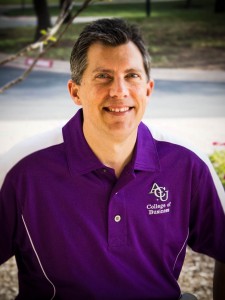
Dr. Kyle Tippens, Professor
In Personal Financial Planning, Tippens begins with what the Bible has to say about money. “We talk a lot about stewardship, giving, and what those mean for those who live a life called to Christ and practical ways to put those in practice,” said Tippens. Students learn how to plan for themselves and about all of the seemingly-daunting financial decisions they will soon start to make. They learn about savings and checking accounts, budgeting, what insurance to buy or not buy, how to save for retirement, estate planning, and much more. Tippens wants students to understand that finances do not have to be overwhelming. Breaking it down into pieces helps to demystify finances and students often realize that it is not as complicated as people make it seem. “Students often describe this class as the learning-how-to-be-an-adult class,” said Tippens. “At the bottom line, it is about how to be out in the real world and not be overwhelmed by all of the choices that will be available to you.”
Many students who have taken Personal Financial Planning have contacted Tippens after graduation and tell him how they have used materials from the class just weeks after graduating and feel more ready and prepared than most of their peers. Aric Wilson, a sophomore management major from The Woodlands, is currently taking Personal Financial Planning. “I was amazed by how many everyday things that I will definitely need to know after graduation that I had no clue about,” noted Wilson. “This class is about life and how to succeed in the future and I feel much more prepared for taking it.” Wilson also appreciated how Tippens teaches the class using personal examples from his life and believes that the reason he gets so much out of the class is the way Tippens works hard to teach it in relatable ways. Even though there are so many practical topics that are thoroughly covered and explained in Personal Financial Planning, Tippens hopes that a student’s biggest takeaway from the class is the importance of generosity, saving, and living beneath their means.
Another unique aspect of Personal Financial Planning that it has no prerequisites, which is very unusual for a 400-level finance class. “Regardless of your major,” explained Tippens. “If you focus on the class you will do well. There are no incredible math skills necessary.” For this reason, Personal Financial Planning is a popular elective all around campus. Students of all majors have registered for the class to learn more about preparing for their future. Olivia Dahl, a senior biology major from Round Rock, took Personal Financial Planning because she wanted to be prepared to succeed financially, especially as she enters medical school soon. Dahl believes that this class is the most practical one she has taken during her time at ACU and would encourage others to take this class because it is an easy way to be exposed to important information. “Dr. Tippens made it easy and painless to learn,” Dahl said. “It was obvious that he wanted to give us this information so that we could be prepared for the future. I would tell every student that has room in their degree plan to take this course.”
Personal Financial Planning is offered in both the fall and the spring. There are no class prerequisites but, to enroll, a student must have already completed 72 earned hours. The practical nature of the class and the dedicated, Christ-centered instruction from Dr. Tippens make Personal Financial Planning an invaluable class to students from every major at ACU.
by M. C. Jennings | Apr 4, 2018 | Academics, COBA Events, Current Students, Faith Infusion, Student Spotlights, Uncategorized
COBA donors, scholarship recipients, Dean’s Council, and faculty and staff gathered on Thursday, March 22nd, at the annual Ruth Allen Griggs Scholarship Luncheon. The luncheon, inspired by the memory of the hospitable Ruth Allen Griggs, seeks to honor the spirit of generosity and to encourage others to give back. Each table was buzzing with discussion as students, donors, and faculty members conversed about their experiences at ACU and why giving is so important.
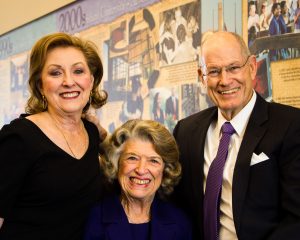
Ann Griggs, Ann Berger Griggs, and Jack Griggs
Students Anna Hornell, junior management major from Fort Worth, TX, and Darius Bell, senior computer science major from Frisco, TX, represented students who have received COBA scholarships, speaking to the audience about what receiving those scholarships has meant to them and the impact that it has had on their education and experiences at ACU.
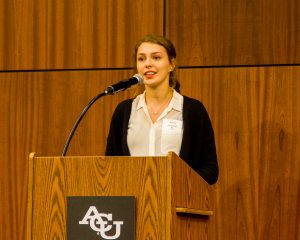
Anna Hornell, junior management major from Fort Worth, TX
Anna said, “The Ruth Allen Griggs Luncheon was such an amazing opportunity for students and donors to meet! It was a time for students to express gratitude to those who allowed them enriching and even life- changing opportunities and to be inspired to generosity both now and in the future. I am hopeful that donors enjoyed connecting with students and hearing about the experiences that they have blessed them with.”
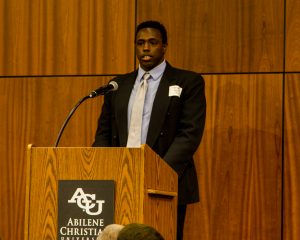
Darius Bell, senior computer science major from Frisco, TX
Darius said, “Giving back creates a thread that binds us all together. Although it is not always easy or convenient, it gives birth to community, community gives birth to a culture, and a culture gives birth to a lasting hope. Receiving this scholarship from the College of Business Administration revealed to me that ACU’s mission and vision extends past the plaques the name is written on and actually lives within the hearts and lives of the donors.”
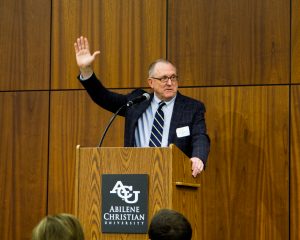
Gary Skidmore, guest speaker, talks about the importance of giving
Gary Skidmore, Chairman of Aberdeen, member of the COBA Dean’s Council, and former ACU Board Trustee spoke to the crowd, relaying a story Dr. Condoleezza Rice tells about her grandfather. “She said that when her grandfather went to college, he paid for his first year in cotton. His sophomore year, he was asked how he would pay for school and he said, ‘I am out of cotton,’ so they said, ‘You are out of luck.’ He asked how the other boys were going to pay. They said, ‘They have what is called a scholarship and if you wanted to be a Presbyterian minister, you could have a scholarship, too.’ My grandfather said, ‘That is exactly what I had in mind.’ Dr. Rice stated that ‘My family has been Presbyterian and college educated ever since. That access to education changed everything. Not just for him, but for generations to come.” Skidmore noted that because of her family’s legacy of education, Condoleezza Rice has gone on to become both a Professor and Provost at Stanford University, National Security Advisor, and Secretary of State. He went on to say, “We’ve all likely received some sort of scholarship” citing statistics that 75% of all college students receive some sort of financial aid and that scholarships are one way we model what Jesus taught us as Christians – to help others. He stated, “We don’t know what will happen if someone is enabled to attend ACU…how their life will be changed. I know I don’t want to learn someday, if only someone had given, cancer would have been cured. In giving, both the giver and the receiver benefit.”
Dean Brad Crisp summed the event up by saying, “The Griggs Luncheon is a favorite event of mine because of the way it reflects and underscores our values. As COBA updates our guiding statements to describe our deeply held values, we are emphasizing how our Christian faith leads us to gratitude and generosity. This event allows our students to express their gratitude for the generosity of our donors.”
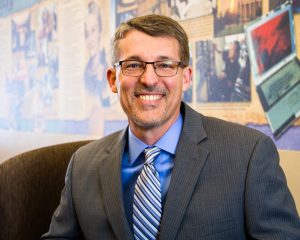
Dr. Brad Crisp
by Hanna Roberts | Apr 2, 2018 | Academics, Current Students, Faith Infusion, Marketing, Poverty and Development, Student Spotlights, Student Spotlights, Uncategorized
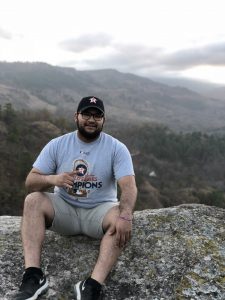
Caleb Casas, junior management and marketing major from Houston, TX.
Over spring break, the Griggs Center and Halbert Institute partnered to send a group of students led by Dodd Roberts with Dr. Sarah Easter to Honduras. The group collaborated with Mission Lazarus to work within the communities on a service trip. Caleb Casas, a junior marketing and management major from Houston, was one of the students who went and served. Part of the trip entailed meeting with small business owners to help them with current endeavors and to develop new business ideas. Led by Dr. Sarah Easter and Erika Teilmann, a junior management major from Houston, the group of students met for several weeks before their departure to learn about the business climate of the communities they would be working amidst in Honduras. They researched the businesses, resource availability, education levels, income levels, and more. The group kept it a priority to remember that they were not the experts and that they need to trust the people that actually live and work with people in those communities, the people that understand the everyday circumstances, to determine the feasibility of an idea. The students were challenged to read Philippians 2:1-8 before going into the communities to prepare a servant heart within themselves and to learn of and how to imitate Christ’s humility.
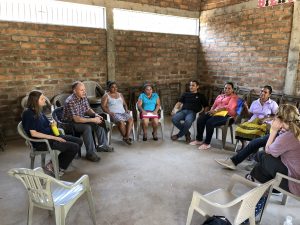 Caleb and the other students met with locals in Namasigue and Cedeño, villages in Honduras, to help build existing businesses and develop new ideas. The people talked about how they would use their businesses to help out the community: to make it possible for everyone to have a little money to buy from one another, to send kids to school, to give to the church, to employ others, and more. In the Namasigue village, all of the businesses are tied together. If only a few people operate a business, then the rest of the village would be unable to purchase from them and would force business owners to sell to ‘coyotes,’ people from bigger cities who come to purchase products in the villages at an extremely low price. It seemed to Caleb that the people had an excellent grasp of how to operate a business in the village but desired feedback on their ideas. They taught the villagers basic accounting so that they could better run their businesses by keeping accurate records, financial statements, and balancing the cost of the business. Both the students and the villagers were able to learn a lot from each other. For example, they met with a woman who planned to sell pigs and wanted to start off with ten. The group encouraged her to start off with three and to buy three pigs every few months so that she had a cycle of product and a steady stream of income instead of trying to sell all of her pigs at the same time. The group suggested that she purchase a male and female to begin breeding so that she wouldn’t have to buy pigs to resell but the women explained that the time and money it takes to breed with the resources available to her was too great for her to ever make a profit.
Caleb and the other students met with locals in Namasigue and Cedeño, villages in Honduras, to help build existing businesses and develop new ideas. The people talked about how they would use their businesses to help out the community: to make it possible for everyone to have a little money to buy from one another, to send kids to school, to give to the church, to employ others, and more. In the Namasigue village, all of the businesses are tied together. If only a few people operate a business, then the rest of the village would be unable to purchase from them and would force business owners to sell to ‘coyotes,’ people from bigger cities who come to purchase products in the villages at an extremely low price. It seemed to Caleb that the people had an excellent grasp of how to operate a business in the village but desired feedback on their ideas. They taught the villagers basic accounting so that they could better run their businesses by keeping accurate records, financial statements, and balancing the cost of the business. Both the students and the villagers were able to learn a lot from each other. For example, they met with a woman who planned to sell pigs and wanted to start off with ten. The group encouraged her to start off with three and to buy three pigs every few months so that she had a cycle of product and a steady stream of income instead of trying to sell all of her pigs at the same time. The group suggested that she purchase a male and female to begin breeding so that she wouldn’t have to buy pigs to resell but the women explained that the time and money it takes to breed with the resources available to her was too great for her to ever make a profit.
 The students also built latrines in the villages as a part of Mission Lazarus’ public health campaigns that aim to engage the community through health promotion and prevention and share essential health teachings with families and communities. The latrines were a tremendous step in both sanitation and privacy for families in the communities. Caleb was struck by how something as small as a latch on a bathroom door gave people basic human dignity. “In America, we don’t have to ever worry about finding a private bathroom to use no matter where we go,” said Caleb. “But the simple act of installing a two-dollar latch allowed these people to go about their business in private and gave them dignity. There was a man who had gone over eighty years without a private bathroom and I was struck by how often I take something like a toilet for granted.” Caleb was also moved by the Hondurans’ gratitude and willingness to work. “They didn’t want us to do the work for them but wanted to work alongside us,” he noted. For the families to even receive a latrine, they had to dig the hole themselves before people would come install the physical latrine. For some people, this meant digging a twelve-foot hole with nothing but a shovel and a chisel. One man chiseled through two feet of solid rock alone. Even though they had done all of this back-breaking work to lay the foundation for the latrines, when the students came to install them, the villagers worked alongside them, helping mix and lay concrete, drilling, and installing the roof. After they had finished installing one of the latrines, a man came and gave them mangoes, which was all he had to give. Caleb was amazed that the people were so grateful that they were willing to give up all that they had to say thank you to the students.
The students also built latrines in the villages as a part of Mission Lazarus’ public health campaigns that aim to engage the community through health promotion and prevention and share essential health teachings with families and communities. The latrines were a tremendous step in both sanitation and privacy for families in the communities. Caleb was struck by how something as small as a latch on a bathroom door gave people basic human dignity. “In America, we don’t have to ever worry about finding a private bathroom to use no matter where we go,” said Caleb. “But the simple act of installing a two-dollar latch allowed these people to go about their business in private and gave them dignity. There was a man who had gone over eighty years without a private bathroom and I was struck by how often I take something like a toilet for granted.” Caleb was also moved by the Hondurans’ gratitude and willingness to work. “They didn’t want us to do the work for them but wanted to work alongside us,” he noted. For the families to even receive a latrine, they had to dig the hole themselves before people would come install the physical latrine. For some people, this meant digging a twelve-foot hole with nothing but a shovel and a chisel. One man chiseled through two feet of solid rock alone. Even though they had done all of this back-breaking work to lay the foundation for the latrines, when the students came to install them, the villagers worked alongside them, helping mix and lay concrete, drilling, and installing the roof. After they had finished installing one of the latrines, a man came and gave them mangoes, which was all he had to give. Caleb was amazed that the people were so grateful that they were willing to give up all that they had to say thank you to the students.
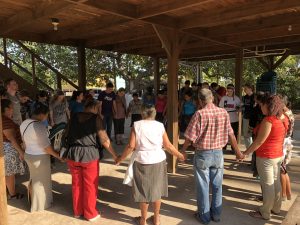 In Honduras, Caleb experienced and was impacted by was God’s purpose and design in bringing us to a specific time and place. Caleb’s grandfather was a pastor in Mexico but came to the US to start a Spanish-speaking congregation within Bammel Church in Houston. Caleb remembered hearing stories about his grandma growing up in Saltillo – no running water, an outhouse that was a mile away, playing soccer with rocks – and realized that, if it had not been for his grandfather saying “yes” to the Lord and leaving his work in Mexico, Caleb could have been in a similar situation to the people he was serving in Honduras. “I was serving what could have been my grandpa,” Caleb realized. “Maybe in three generations, like my family, those people could be in America or helping grow Honduras. You never know what impact you or God will have on people and their life trajectory.”
In Honduras, Caleb experienced and was impacted by was God’s purpose and design in bringing us to a specific time and place. Caleb’s grandfather was a pastor in Mexico but came to the US to start a Spanish-speaking congregation within Bammel Church in Houston. Caleb remembered hearing stories about his grandma growing up in Saltillo – no running water, an outhouse that was a mile away, playing soccer with rocks – and realized that, if it had not been for his grandfather saying “yes” to the Lord and leaving his work in Mexico, Caleb could have been in a similar situation to the people he was serving in Honduras. “I was serving what could have been my grandpa,” Caleb realized. “Maybe in three generations, like my family, those people could be in America or helping grow Honduras. You never know what impact you or God will have on people and their life trajectory.”
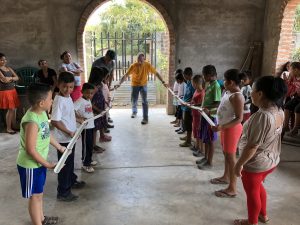 Another surreal moment that Caleb experienced in Honduras was meeting Luis, the preacher of the Honduran church the group was working with. Luis was born in Honduras but moved to the US and actually attended Caleb’s Bammel. Bammel Church sponsored Luis to attend the Baxter Institute, a seminary school in Guatemala. Caleb’s grandfather also taught classes at Baxter during Luis’ time there. Once Luis graduated, he had twenty-three churches where he could have served but felt a calling to go to Namasigue. Caleb was amazed at how God brought them together and connected them at this specific time and place where they were both serving together. “There were so many points in our lives where things could have happened differently,” Caleb said. “Nonetheless, God intersected our lives and that made an impact on me.”
Another surreal moment that Caleb experienced in Honduras was meeting Luis, the preacher of the Honduran church the group was working with. Luis was born in Honduras but moved to the US and actually attended Caleb’s Bammel. Bammel Church sponsored Luis to attend the Baxter Institute, a seminary school in Guatemala. Caleb’s grandfather also taught classes at Baxter during Luis’ time there. Once Luis graduated, he had twenty-three churches where he could have served but felt a calling to go to Namasigue. Caleb was amazed at how God brought them together and connected them at this specific time and place where they were both serving together. “There were so many points in our lives where things could have happened differently,” Caleb said. “Nonetheless, God intersected our lives and that made an impact on me.”
Caleb was absolutely impacted during his time in Honduras. The opportunity to serve and work alongside the people in Namasigue and Cedeño showed him how God works in incredible and mind-blowing ways and His plan is always good. Caleb looks forward to the potential to return to Honduras soon and is even talking about going back this summer.
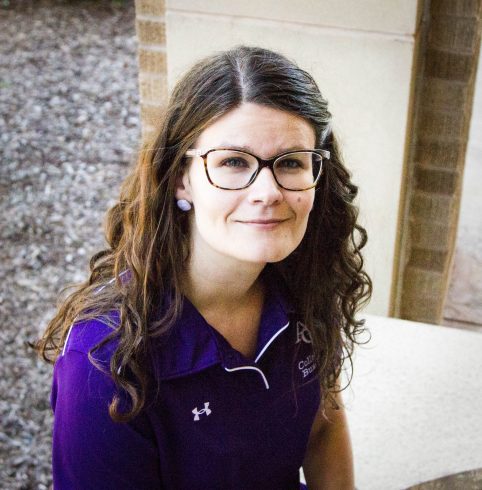
by Hanna Roberts | Feb 23, 2018 | Academics, COBA Faculty, Poverty and Development, Research, Social Entrepreneurship, Uncategorized
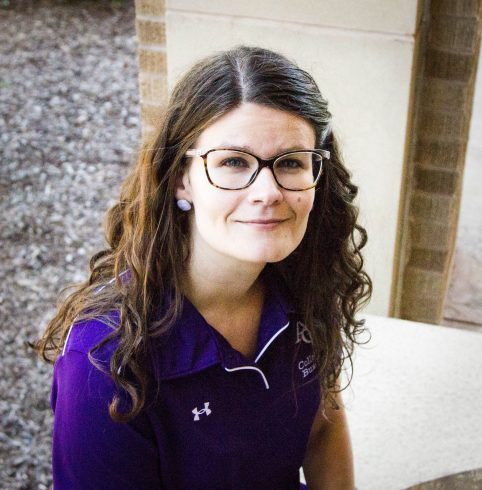
Dr. Sarah Easter is a professor in the College of Business Administration and teaches classes like Strategic Management, Business and Sustainability, and International Business.
Over the summer, Dr. Sarah Easter attended the Academy of Management (AOM) Annual Meeting: a professional association for over 10,000 management and organization scholars whose mission is to build a vibrant and supportive community of scholars by markedly expanding opportunities to connect and explore ideas. The theme of this year’s AOM Annual Meeting was ‘Improving Lives’ and specifically focused on how organizations can contribute to the betterment of society through elevating the health and well-being of those who live in it. In her dissertation research, Dr. Easter conducted a sixteen-month ethnographic study of a coalition to end homelessness in Western Canada. The coalition involved over forty different governmental, business and nonprofit players and she examined how they worked together toward common goals while considering many different perspectives. Dr. Easter presented a paper over one of the key findings of this research and received the Best Paper Award based on a Dissertation from the Managerial and Organizational Cognition Division of the Academy of Management.
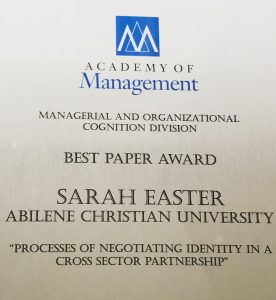
Dr. Sarah Easter was presented with the Best Paper Award for processes of negotiating identity in a cross-sector partnership.
Dr. Easter’s dissertation research centered on the challenge of the coalition: developing a cohesive and unified identity (i.e., its focal purpose and goals) in the face of a variety of different perspectives. Those involved in the coalition had many different viewpoints on what the central issue they were working to address entailed, which was homelessness. Even though all participants talked about the notion that the overall vision to end homelessness was well understood by all involved, the result was that the partnership was often pulled in multiple directions simultaneously. The findings speak to the importance of such collaborative partnerships as being very explicit in terms of the vision they are working to achieve. This involves having ongoing discussions and check-in points to ensure that all players are able to clearly articulate the direction of the partnership, including underlying meanings of terms utilized, particularly as participants are continually cycling in and out. Dr. Easter was fascinated in learning how a diverse body of organizations and individuals from public, private and nonprofit sectors come together to address a significant societal issue over time and was able to develop a deep understanding as to how the coalition evolved over time in the presence of many and very different ways of working.
Dr. Easter took special notice of the pull between both opportunities and challenges that organizations face in carrying out their work while conducting her research. This is something she emphasizes while teaching classes like Strategic Management, Business and Sustainability, and International Business. “I believe strongly that it is important to consider both dimensions in order to develop a more holistic perspective of a given organization’s current situation,” Dr. Easter emphasized. “I bring up this example in my courses: an organization that has incredible potential to make an impact in addressing homelessness in the local region (opportunity). At the same time, though, there are incredible challenges associated with this complex structure.” Dr. Easter continues a passion for studying how people work across cultural and socioeconomic structures especially through addressing major societal challenges and looks for ways to connect with people and organizations as well as share this passion with her students in the classroom.
by Hanna Roberts | Nov 27, 2017 | Academics, Athletics, COBA Faculty
If you go to any ACU home game, you are sure to see Dr. Jonathan Stewart, finance professor, sitting in the stands or standing on the sidelines, cheering on the Wildcats. This year, Dr. Stewart is ACU’s Faculty Athletics Representative (FAR). FARs are chosen to help create a caring and supportive campus environment to grow and advocate for student-athletes. The FAR is involved in helping make sure that student-athletes have the appropriate systems and environments in place so that they can succeed in academics and as a person.
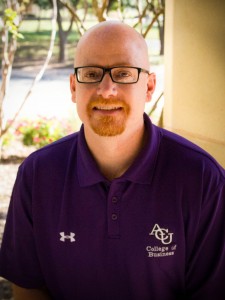
Dr. Jonathan Stewart
Dr. Stewart has taught Financial Management, a required class for all business majors, for the last fifteen years and in doing so, has felt privileged to meet so many students. Being the FAR allows him to get to know students in other majors with whom he would not normally interact and build relationships and friendships with them. Dr. Stewart is in charge of overseeing a committee that checks student-athlete eligibility and making sure they are meeting NCAA and ACU requirements. ACU only allows student-athletes to miss a certain amount of classes, so Dr. Stewart approves travel schedules. A large part of his job is just being available to student-athletes so that they can feel comfortable talking to him about difficulties or just to chat. Dr. Stewart tries to go by practices and travels with each team at least once so they can see his face and become familiar with him. His favorite part of the job is coordinating the guest coaching program. Student-athletes nominate their favorite faculty and staff to be honored as guest coaches. Guest coaches can go to practices, watch film, attend pregame meals, and see what the student-athletes do day-to-day beyond the classroom. Dr. Stewart loves to see how it blesses the faculty and staff that get nominated and meeting those individuals who have such a strong positive influence on ACU’s student-athletes. “I get to meet the faculty and staff that the students love,” said Dr. Stewart. “It is also good for them to see how much time, dedication, and love the student-athletes put into what they do.”
Working as ACU’s FAR certainly aligns with Dr. Stewart’s calling to mentor and teach. It allows him to know and interact with a much bigger group of students, all with different concerns, majors, and backgrounds. “I am still learning and trying to find my way,” said Dr. Stewart. “It is fun to say hi to people while I am walking around campus or checking up on how things are with students in the Bean or in chapel.” Dr. Stewart tries to practice mindful prayer for the student-athletes. For example, there always injuries and physical struggles in athletics, so when Dr. Stewart sees someone in a brace or on crutches, he says that he prays for their healing and peace. “It can be stressful for an injured athlete to not compete and be with the team. I try to be really intentional about praying for them and following up on that,” says Dr. Stewart. Student-athletes also have to be exceptional time managers to succeed in the long run. Dr. Stewart prays for their ability to be well-organized and uncommonly focused and makes sure to be available to help students achieve those goals.
Like the rest of us, Dr. Stewart was very excited about having ACU football back on campus in the brand-new Anthony Stadium. In particular, Dr. Stewart has really enjoyed the opportunities that the stadium has provided for communities at ACU and in Abilene. He enjoys walking through tailgates and seeing students setting up their tents and alumni catching up with each other. In Dr. Stewart’s eyes, the stadium has brought about a great improvement and positive effect upon ACU culture, especially when it comes to athletics. “I hope that the excitement that having a home stadium has created will bleed over into other athletic events,” said Dr. Stewart. “We can use this as a way to support and encourage each other no matter if we are a professor, student, athlete, or alumni and focus on building relationships and improving our community.”
Be sure to come say hi to Dr. Stewart at all of our home games and cheer on our student-athletes. Go Wildcats!
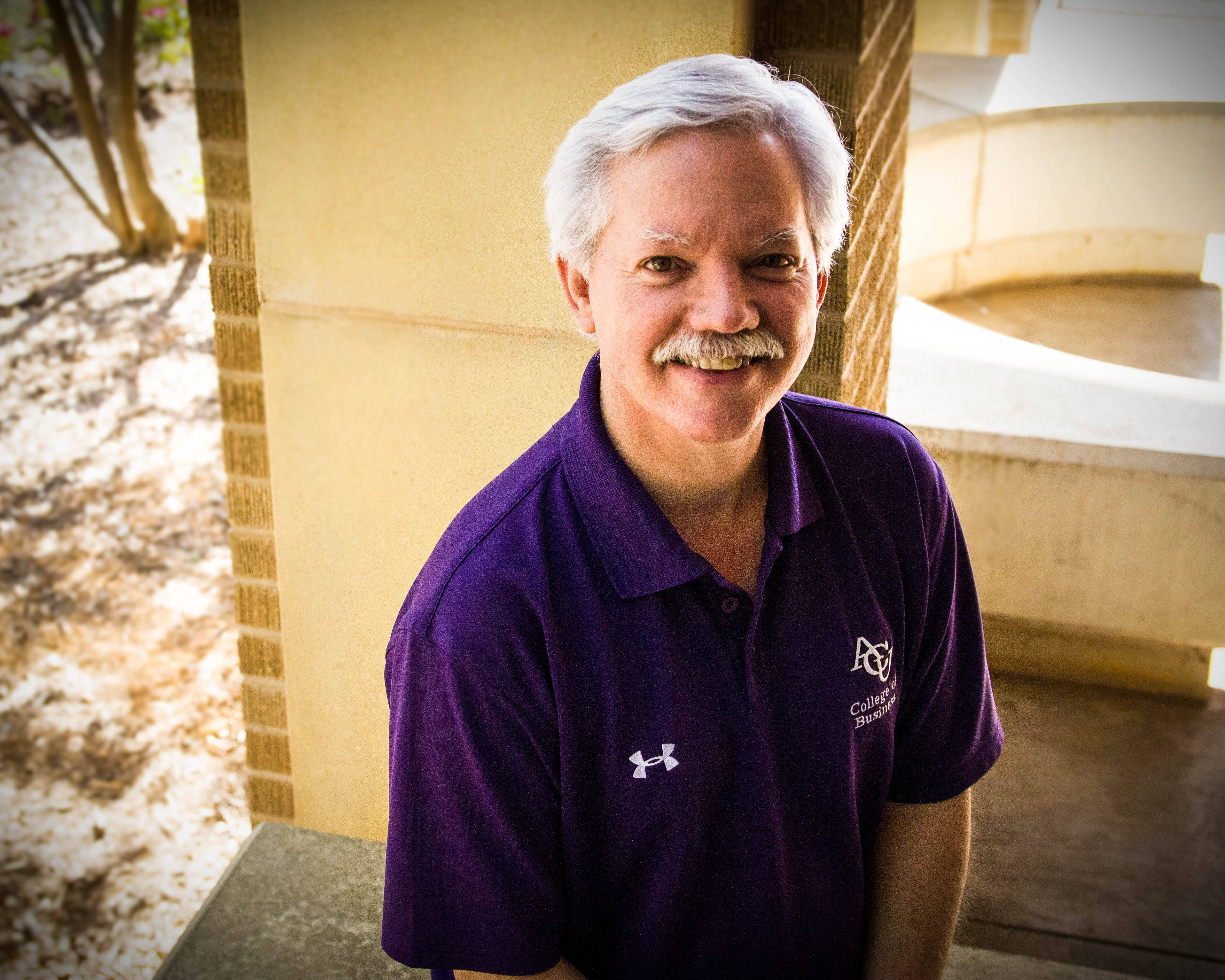
by Hanna Roberts | Nov 6, 2017 | Academics, CCCU, COBA Faculty, Uncategorized
When you walk into Dr. Monty Lynn’s office, you are struck with a sense of peace and quiet and are greeted with a warm handshake and an even warmer smile. Talking with him, you get the sense that you are heard and paid attention to, that everything said in that room is important to him. Recently, Dr. Lynn was honored with the Christian Business Faculty Association’s Teaching Award. Once a year, business faculties in a network of 110 faith-based schools meet to share ideas about teaching and research and to honor outstanding members in the CBFA. The CBFA Teaching Award was established by the Christian Business Faculty Association to perpetuate Christ-like teaching and to recognize Christian business faculty members who emulate the character, engagement, and calling of Christ to the work and ministry of transformational education. These are all certainly descriptors of Monty Lynn and we could not think of a more fitting person to receive this award.
Dr. Lynn is held in very high esteem by his peers and students. Mark Phillips, Professor and Management Sciences Department Chair, describes Dr. Lynn as the ‘face’ of COBA to many generations of new business students, as they begin their academic career in Dr. Lynn’s Intro to Business course. Phillips recalls students describing Dr. Lynn as incredibly, unbelievably nice, which made it all the more shocking when they learned that he gives such hard exams. “Everything he does is  accomplished with excellence and grace,” says Phillips. “Monty exemplifies the type of faculty member we try to hire and retain.” Dr. Lynn treats everyone with the utmost respect; you are always given his undivided attention and he is very intentional in the curriculums that he teaches and the advice that he gives. He teaches business in a context that reflects how one can use their skills to benefit others and to be a selfless person in the world. Dr. Lynn invests in his students. He is gifted in his ability to leave a lasting impression on those who encounter his words of wisdom. While teaching students the fundamentals of business, he is also instilling in future generations how to combat the challenges of this world with an empathetic heart and a servant’s mentality. Elisabeth Danelski, a junior finance major, and Dr. Lynn’s student worker, said that Dr. Lynn is one of the biggest blessings she has received in her time here at ACU. “Now he is not only my mentor but someone who I share my daily stories with. I come to him when I’m at my wits end seeking advice and most importantly, someone who I hope to have in my life long after I graduate,” she said. “I am so excited the humblest person I know is receiving recognition for the dedication and passion he brings to his field in such a Christ-like manner.”
accomplished with excellence and grace,” says Phillips. “Monty exemplifies the type of faculty member we try to hire and retain.” Dr. Lynn treats everyone with the utmost respect; you are always given his undivided attention and he is very intentional in the curriculums that he teaches and the advice that he gives. He teaches business in a context that reflects how one can use their skills to benefit others and to be a selfless person in the world. Dr. Lynn invests in his students. He is gifted in his ability to leave a lasting impression on those who encounter his words of wisdom. While teaching students the fundamentals of business, he is also instilling in future generations how to combat the challenges of this world with an empathetic heart and a servant’s mentality. Elisabeth Danelski, a junior finance major, and Dr. Lynn’s student worker, said that Dr. Lynn is one of the biggest blessings she has received in her time here at ACU. “Now he is not only my mentor but someone who I share my daily stories with. I come to him when I’m at my wits end seeking advice and most importantly, someone who I hope to have in my life long after I graduate,” she said. “I am so excited the humblest person I know is receiving recognition for the dedication and passion he brings to his field in such a Christ-like manner.”
It is clear how others see Dr. Lynn – gracious, intentional, and Christ-like. Dr. Lynn says that he always imagines himself as a student when he teaches a class and asks himself what he would want to learn, what he would be curious about, and what he would need to know. Dr. Lynn said that no class of his is ever the same. “I always tweak my classes every semester,” he said. “You have to change because things change in business constantly; there are always new examples, insights, and experiences.” Dr. Lynn’s engagement with his students is evident in this way; he makes every semester better and more relevant to that specific group of students so that they can learn and grow in the specific ways they need. His intentionality with students makes him beloved. Dr. Lynn’s commitment to lifelong learning also contributes to his status as an excellent teacher. It says something when a teacher is more eager to learn than they are to teach and his love for learning shows in the way he carries himself in the classroom. He treats every day as an opportunity to gain a new perspective and to allow the experiences of others to change the way he sees this world. We could not be more proud to call Dr. Lynn one of our own and are excited to see how he continues to teach and impact every student that walks into his classroom.





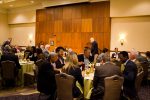




 Caleb and the other students met with locals in Namasigue and Cedeño, villages in Honduras, to help build existing businesses and develop new ideas. The people talked about how they would use their businesses to help out the community: to make it possible for everyone to have a little money to buy from one another, to send kids to school, to give to the church, to employ others, and more. In the Namasigue village, all of the businesses are tied together. If only a few people operate a business, then the rest of the village would be unable to purchase from them and would force business owners to sell to ‘coyotes,’ people from bigger cities who come to purchase products in the villages at an extremely low price. It seemed to Caleb that the people had an excellent grasp of how to operate a business in the village but desired feedback on their ideas. They taught the villagers basic accounting so that they could better run their businesses by keeping accurate records, financial statements, and balancing the cost of the business. Both the students and the villagers were able to learn a lot from each other. For example, they met with a woman who planned to sell pigs and wanted to start off with ten. The group encouraged her to start off with three and to buy three pigs every few months so that she had a cycle of product and a steady stream of income instead of trying to sell all of her pigs at the same time. The group suggested that she purchase a male and female to begin breeding so that she wouldn’t have to buy pigs to resell but the women explained that the time and money it takes to breed with the resources available to her was too great for her to ever make a profit.
Caleb and the other students met with locals in Namasigue and Cedeño, villages in Honduras, to help build existing businesses and develop new ideas. The people talked about how they would use their businesses to help out the community: to make it possible for everyone to have a little money to buy from one another, to send kids to school, to give to the church, to employ others, and more. In the Namasigue village, all of the businesses are tied together. If only a few people operate a business, then the rest of the village would be unable to purchase from them and would force business owners to sell to ‘coyotes,’ people from bigger cities who come to purchase products in the villages at an extremely low price. It seemed to Caleb that the people had an excellent grasp of how to operate a business in the village but desired feedback on their ideas. They taught the villagers basic accounting so that they could better run their businesses by keeping accurate records, financial statements, and balancing the cost of the business. Both the students and the villagers were able to learn a lot from each other. For example, they met with a woman who planned to sell pigs and wanted to start off with ten. The group encouraged her to start off with three and to buy three pigs every few months so that she had a cycle of product and a steady stream of income instead of trying to sell all of her pigs at the same time. The group suggested that she purchase a male and female to begin breeding so that she wouldn’t have to buy pigs to resell but the women explained that the time and money it takes to breed with the resources available to her was too great for her to ever make a profit. The students also built latrines in the villages as a part of Mission Lazarus’
The students also built latrines in the villages as a part of Mission Lazarus’  In Honduras, Caleb experienced and was impacted by was God’s purpose and design in bringing us to a specific time and place. Caleb’s grandfather was a pastor in Mexico but came to the US to start a Spanish-speaking congregation within
In Honduras, Caleb experienced and was impacted by was God’s purpose and design in bringing us to a specific time and place. Caleb’s grandfather was a pastor in Mexico but came to the US to start a Spanish-speaking congregation within  Another surreal moment that Caleb experienced in Honduras was meeting Luis, the preacher of the Honduran church the group was working with. Luis was born in Honduras but moved to the US and actually attended Caleb’s Bammel. Bammel Church sponsored Luis to attend the Baxter Institute, a seminary school in Guatemala. Caleb’s grandfather also taught classes at Baxter during Luis’ time there. Once Luis graduated, he had twenty-three churches where he could have served but felt a calling to go to Namasigue. Caleb was amazed at how God brought them together and connected them at this specific time and place where they were both serving together. “There were so many points in our lives where things could have happened differently,” Caleb said. “Nonetheless, God intersected our lives and that made an impact on me.”
Another surreal moment that Caleb experienced in Honduras was meeting Luis, the preacher of the Honduran church the group was working with. Luis was born in Honduras but moved to the US and actually attended Caleb’s Bammel. Bammel Church sponsored Luis to attend the Baxter Institute, a seminary school in Guatemala. Caleb’s grandfather also taught classes at Baxter during Luis’ time there. Once Luis graduated, he had twenty-three churches where he could have served but felt a calling to go to Namasigue. Caleb was amazed at how God brought them together and connected them at this specific time and place where they were both serving together. “There were so many points in our lives where things could have happened differently,” Caleb said. “Nonetheless, God intersected our lives and that made an impact on me.”




 accomplished with excellence and grace,” says Phillips. “Monty exemplifies the type of faculty member we try to hire and retain.” Dr. Lynn treats everyone with the utmost respect; you are always given his undivided attention and he is very intentional in the curriculums that he teaches and the advice that he gives. He teaches business in a context that reflects how one can use their skills to benefit others and to be a selfless person in the world. Dr. Lynn invests in his students. He is gifted in his ability to leave a lasting impression on those who encounter his words of wisdom. While teaching students the fundamentals of business, he is also instilling in future generations how to combat the challenges of this world with an empathetic heart and a servant’s mentality. Elisabeth Danelski, a junior finance major, and Dr. Lynn’s student worker, said that Dr. Lynn is one of the biggest blessings she has received in her time here at ACU. “Now he is not only my mentor but someone who I share my daily stories with. I come to him when I’m at my wits end seeking advice and most importantly, someone who I hope to have in my life long after I graduate,” she said. “I am so excited the humblest person I know is receiving recognition for the dedication and passion he brings to his field in such a Christ-like manner.”
accomplished with excellence and grace,” says Phillips. “Monty exemplifies the type of faculty member we try to hire and retain.” Dr. Lynn treats everyone with the utmost respect; you are always given his undivided attention and he is very intentional in the curriculums that he teaches and the advice that he gives. He teaches business in a context that reflects how one can use their skills to benefit others and to be a selfless person in the world. Dr. Lynn invests in his students. He is gifted in his ability to leave a lasting impression on those who encounter his words of wisdom. While teaching students the fundamentals of business, he is also instilling in future generations how to combat the challenges of this world with an empathetic heart and a servant’s mentality. Elisabeth Danelski, a junior finance major, and Dr. Lynn’s student worker, said that Dr. Lynn is one of the biggest blessings she has received in her time here at ACU. “Now he is not only my mentor but someone who I share my daily stories with. I come to him when I’m at my wits end seeking advice and most importantly, someone who I hope to have in my life long after I graduate,” she said. “I am so excited the humblest person I know is receiving recognition for the dedication and passion he brings to his field in such a Christ-like manner.”